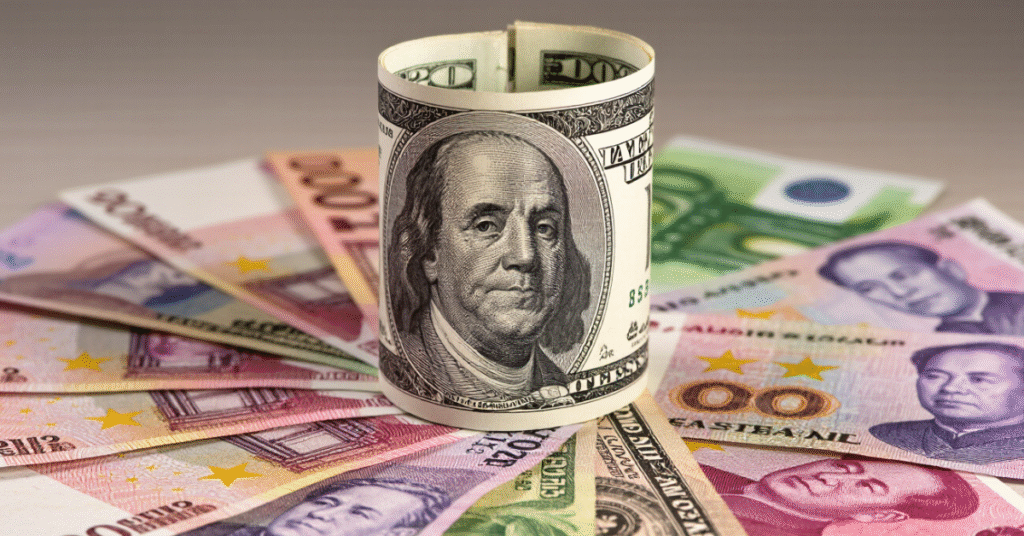
Countries that use the US dollar include nations where USD is the official currency, such as the United States, El Salvador, and Panama, as well as countries where it is widely accepted unofficially, like Cambodia and Zimbabwe. Using USD stabilizes trade and protects economies from local currency fluctuations.
Key Takeaways
- Several countries use the US dollar as their official currency, including El Salvador, Panama, and East Timor.
- Some nations adopt USD unofficially, like Cambodia, Zimbabwe, and Lebanon, to stabilize their economies.
- Using the US dollar helps countries control inflation and maintain economic stability.
- Dollarization can have both benefits and drawbacks for local economies and citizens.
- Traders can leverage USD adoption when trading forex or international currencies.
Understanding USD Usage in Countries
Some countries fully adopt the US dollar as their official currency, a process known as full dollarization. This means all transactions, salaries, and government finances are conducted in USD, providing stability in economies with weak local currencies.
Other nations practice partial or unofficial dollarization, where the US dollar is widely accepted alongside the local currency. For example, Cambodia and Zimbabwe allow USD for trade, savings, and large transactions, even though their national currency is still in use.
Countries That Use the US Dollar as Official Currency
Several countries have adopted the US dollar as their official legal tender, meaning all transactions and government operations are conducted in USD. Here’s a list of key nations:
- United States: The origin of the US dollar; all domestic transactions are in USD.
- El Salvador: Officially adopted USD in 2001 to stabilize the economy and encourage investment.
- Panama: Uses USD alongside the Panamanian balboa; widely accepted for all transactions.
- East Timor: Adopted USD post-independence for economic stability.
- Ecuador: Dollarized in 2000 after a financial crisis to control inflation.
- Zimbabwe: Switched to USD and other foreign currencies after hyperinflation of its local currency.
Countries Where USD is Widely Used (Unofficially)
Some countries have not adopted the US dollar as their official currency but still use it extensively in trade, savings, and large transactions. This is known as partial or unofficial dollarization. Examples include:
- Cambodia: USD is widely used alongside the Cambodian riel, especially for larger purchases, rentals, and international trade.
- Lebanon: Due to local currency instability, USD is commonly used for savings and business transactions.
- Panama: While officially dollarized, local coins and minor currency usage remain, illustrating partial adoption in daily life.
- Zimbabwe: Uses USD alongside other foreign currencies after hyperinflation rendered the Zimbabwean dollar unreliable.
Why Countries Adopt the US Dollar

Countries choose to adopt the US dollar for several economic and financial reasons, including:
- Economic Stability: Using USD protects economies from local currency volatility and inflation, especially in countries with weak financial systems.
- Trade Facilitation: USD is the most widely accepted global currency, making international trade and investment simpler.
- Attracting Foreign Investment: Dollarization reduces currency risk for foreign investors, encouraging more inflows.
- Financial Credibility: Tying the economy to USD boosts trust in banking and government financial operations.
Impact on Local Economies and Citizens
Adopting the US dollar has both benefits and drawbacks for countries and their citizens:
Pros:
- Economic Stability: Reduces the risk of hyperinflation and protects savings.
- Simplified Trade: Facilitates easier international transactions and lowers currency conversion costs.
- Investor Confidence: Attracts foreign investments due to predictable currency value.
Cons:
- Loss of Monetary Policy Control: Countries cannot print their own money or adjust interest rates independently.
- Dependence on USD: Economic fluctuations in the United States directly affect local economies.
- Limited Flexibility: Responding to local crises becomes harder without control over currency.
How This Relates to Traders
For forex and international currency traders, knowing which countries use the US dollar can create strategic opportunities. USD adoption affects currency pairs, liquidity, and trading volume.
Traders can leverage this by trading USD pairs with brokers like Defcofx, which offers:
- High Leverage Options: Up to 1:2000 leverage for greater trading flexibility.
- No Commissions or Swap Fees: Low spreads from 0.3 pips.
- Fast Support and Withdrawals: Processed within 4 business hours, even on weekends.
Final Thoughts on Countries That Use The US Dollar
Dollarization whether official or unofficial offers economic stability to countries struggling with inflation, currency volatility, or weak financial infrastructure. Nations like El Salvador and Panama have adopted the US Dollar fully to strengthen economic credibility, reduce inflation, and simplify trade. On the other hand, countries like Cambodia and Zimbabwe use USD informally, allowing citizens to protect their savings and businesses from local currency depreciation. However, this comes at a cost: these nations surrender control over monetary policy, interest rates, and money supply, tying their fate to the strength of the US economy.
For traders, understanding how and where the US Dollar is used creates an edge in forex and global market strategies. USD remains the most dominant currency worldwide not just for its value, but for its liquidity, influence, and universal acceptance. By recognizing dollarized regions and trading USD-linked pairs through reliable brokers like Defcofx, traders gain access to high liquidity, tight spreads, and stable market conditions ideal for strategic currency trading and wealth growth.
Open a Trading Live AccountFAQs: Countries That Use the US Dollar
Countries like the United States, El Salvador, and Panama use the US dollar as their official and sole currency.
Yes. Countries such as Cambodia, Lebanon, and Zimbabwe accept USD widely alongside their local currencies for trade, savings, and larger transactions.
Dollarization provides economic stability, reduces inflation, facilitates international trade, and attracts foreign investment by lowering currency risk.
Risks include loss of monetary policy control, dependence on US economic conditions, and reduced flexibility in responding to local financial crises.
Traders can leverage USD adoption for better trading opportunities in currency pairs. Using brokers like Defcofx, traders gain access to high leverage, low spreads, and fast withdrawals.
Defcofx Forex Articles You Shouldn’t Miss
Discover powerful forex strategies in these top reads from Defcofx.


